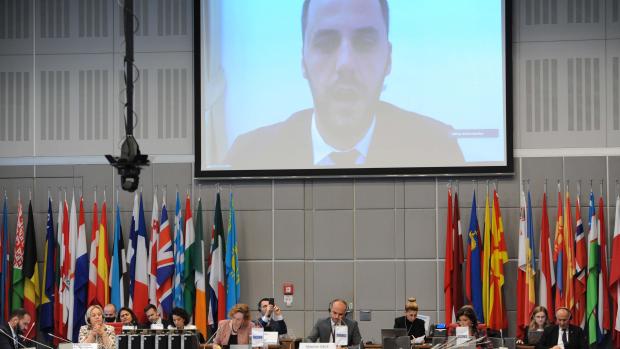Speakers at the conference, which was organized by Albania’s 2020 OSCE Chairmanship and the Strategic Police Matters Unit of the OSCE Secretariat’s Transnational Threats Department, said that transnational organized crime continues to represent one of the most serious global threats to security and stability across the OSCE and Mediterranean regions. Moreover, having witnessed the rapid adaptability of the organized crime to any situation and exploitation of even the global pandemic by criminal groups, there is an urgency to further enhance multi-layered strategic co-operation, they said.
“A holistic, comprehensive and international approach to the complexities of organized crime has become an imperative,” said Albania’s Deputy Minister of Interior, Besfort Lamallari, as he opened the conference. “Albania is convinced that an effective approach requires concerted whole-of-government and multi-stakeholder action, including strong partnerships between criminal justice institutions, civil society and the private sector. This threat needs a multifaceted response – from prevention, through investigations and criminal justice, to rehabilitation – led by democratic institutions that respect human rights and the rule of law.”
OSCE Co-ordinator of Activities to Address Transnational Threats, Ambassador Alena Kupchyna reiterated the need to “enhance the capabilities along the entire criminal justice chain, increase the collaboration with financial institutions and anti-corruption bodies, strengthen international co-operation and make full use of available international legal instruments.” She also highlighted the importance of inclusion of all relevant stakeholders: civil society organizations, academia and the private sector.
Over the course of the conference, the participants highlighted main trends and challenges in the fight against organized crime and presented concrete examples of responses developed by OSCE participating States. There was also a discussion about what more the OSCE participating States and the Mediterranean Partners could do to counter organized crime and illicit finance, such as improving financial crime investigations and the recovery of criminal assets.
The conference’s final session explored the link between organized crime and cyber-enabled crime. The participants examined the extent to which organized crime groups use cyberspace to commit crimes such as fraud and the trafficking of illicit drugs or weapons on the dark web.
Concluding the conference, OSCE Officer-in-Charge/Secretary General, Director of the OSCE Conflict Prevention Centre, Tuula Yrjölä, said: “There is much scope for intensifying our efforts to foster strategic co-operation at all levels in the wider OSCE region, including among and between the OSCE participating States and the Mediterranean Partners for Co-operation. The Mediterranean Partners are particularly exposed to similar challenges and have elaborated tailored responses based on their local realities and needs. Information exchanges and best practices bring mutually-beneficial results.”
The Head of the Task Force for Albania’s OSCE Chairmanship, Inid Milo, concluded: “OSCE participating States, should work together even more closely and intensively so that our commitments in the area of combating organized crime be implemented and translated into concrete actions on the ground. We must not forget that, as in many other crises, the most vulnerable demographics are facing the largest threats. This is why we must commit to have an inclusive approach that will invest not only in repression but also in prevention as well, through work with the youth and education institutions. This is an investment in the future. If we fail to make it today, the cost for our societies of tomorrow will be immense.”
The outcomes of the discussions will help the Transnational Threats Department identify the main and common challenges in combating organized crime, and outline possible joint initiatives with OSCE participating States and Partners for Co-operation.






